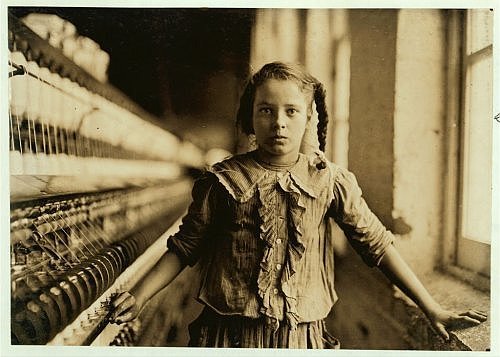
Excerpts, evidence of a female millhand to parliamentary commissioners during an inquiry into factory conditions, c. 1815:
What time did you begin work at the factory?
When I was six years old.What were your hours of labor in that mill?
From 5 in the morning till 9 at night, when they were thronged.For how long a time together have you worked that excessive length of time?
For about a year.What were the usual hours of labour when you were not so thronged?
From six in the morning till 7 at night.What time was allowed for meals?
Forty minutes at noon.Had you any time to get your breakfast or drinking?
No, we had to get it as we could.Explain what you had to do.
When the frames are full, they have to stop the frames, and take the flyers off, and take the full bobbins off, and carry them to the roller, and then put empty ones on, and set the frame going again.Does that keep you constantly on your feet?
Yes, there are so many frames and they run so quick.Your labour is very excessive?
Yes, you have not time for anything.Suppose you flagged a little, or were late, what would they do?
Strap us.Did you live far from the mill?
Yes, two miles.Were you generally there in time?
Yes, my mother has been up at 4 o’clock in the morning, and at 2 o’clock in the morning; the colliers used to go to their work at 3 or 4 o’clock, and when she heard them stirring she has got up out of her warm bed, and gone out and asked them the time; and I have sometimes been at Hunslet Car at 2 o’clock in the morning, when it was streaming down with rain, and we have had to stay till the mill was opened.You are considerably deformed in person as a consequence of this labour?
Yes I am.Where are you now?
In the poorhouse.State what you think as to the circumstances in which you have been placed during all this time of labour, and what you have considered about it as to the hardship and cruelty of it.
“The witness was too much affected to answer the question.”
